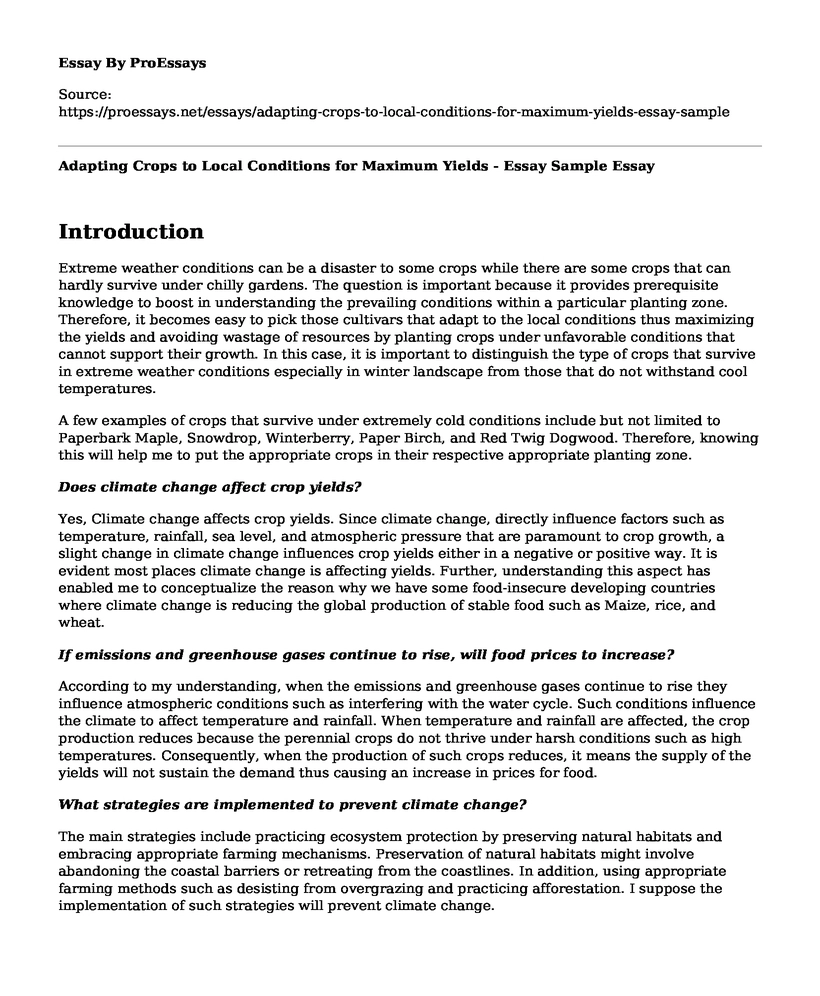Introduction
Extreme weather conditions can be a disaster to some crops while there are some crops that can hardly survive under chilly gardens. The question is important because it provides prerequisite knowledge to boost in understanding the prevailing conditions within a particular planting zone. Therefore, it becomes easy to pick those cultivars that adapt to the local conditions thus maximizing the yields and avoiding wastage of resources by planting crops under unfavorable conditions that cannot support their growth. In this case, it is important to distinguish the type of crops that survive in extreme weather conditions especially in winter landscape from those that do not withstand cool temperatures.
A few examples of crops that survive under extremely cold conditions include but not limited to Paperbark Maple, Snowdrop, Winterberry, Paper Birch, and Red Twig Dogwood. Therefore, knowing this will help me to put the appropriate crops in their respective appropriate planting zone.
Does climate change affect crop yields?
Yes, Climate change affects crop yields. Since climate change, directly influence factors such as temperature, rainfall, sea level, and atmospheric pressure that are paramount to crop growth, a slight change in climate change influences crop yields either in a negative or positive way. It is evident most places climate change is affecting yields. Further, understanding this aspect has enabled me to conceptualize the reason why we have some food-insecure developing countries where climate change is reducing the global production of stable food such as Maize, rice, and wheat.
If emissions and greenhouse gases continue to rise, will food prices to increase?
According to my understanding, when the emissions and greenhouse gases continue to rise they influence atmospheric conditions such as interfering with the water cycle. Such conditions influence the climate to affect temperature and rainfall. When temperature and rainfall are affected, the crop production reduces because the perennial crops do not thrive under harsh conditions such as high temperatures. Consequently, when the production of such crops reduces, it means the supply of the yields will not sustain the demand thus causing an increase in prices for food.
What strategies are implemented to prevent climate change?
The main strategies include practicing ecosystem protection by preserving natural habitats and embracing appropriate farming mechanisms. Preservation of natural habitats might involve abandoning the coastal barriers or retreating from the coastlines. In addition, using appropriate farming methods such as desisting from overgrazing and practicing afforestation. I suppose the implementation of such strategies will prevent climate change.
What are fossil fuels and how do they affect food supply?
Fossil fuels are the forms of energy that emanate from the underground that originate from the natural processes of decomposing organisms. The three main forms of fossil fuel include crude oil, coal, and natural gas. Indeed, fossil fuel affects food supply because the extraction of fossil deposits from underground contributes to environmental damage. Especially the emission of carbon dioxide during combustion of fossil fuel is the main cause of global warming. When global warming happens, it means the production of food is a threat because crop yields will reduce because of global warming.
Cite this page
Adapting Crops to Local Conditions for Maximum Yields - Essay Sample. (2023, Feb 23). Retrieved from https://proessays.net/essays/adapting-crops-to-local-conditions-for-maximum-yields-essay-sample
If you are the original author of this essay and no longer wish to have it published on the ProEssays website, please click below to request its removal:
- Weather and Disasters
- Relationship Between Environment and Cancers Paper Example
- Genetically Modified Food Technologies Essay Example
- Disaster Management in the City of Lufkin
- Essay on Sustainable Measures Needed: Curbing Global Environmental Degradation
- Planetgard: Reputational Risks & Environmental Impacts of Coffee Farming - Essay Sample
- Paper Example on Public Health Crisis: Urgent Action Needed to Restore Environment







